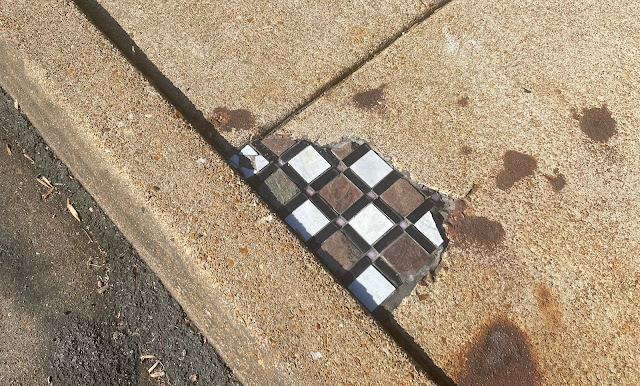I got tripped up over this sidewalk repair yesterday—not physically tripped up but if it hadn't been done, that could very well have been the case! I have walked on this sidewalk along DeMun Avenue in Clayton, MO many times while at Concordia Seminary on the way to Kaldi's where I learned to like coffee too much–but I digress.
This sidewalk repair seems so completely unnecessary in its execution. Who knows how long the chunk of sidewalk was missing. Who knows how long people just avoided it seeing it as nothing more than a trip hazard. But someone, certainly not from the city of Clayton, took the matter into his or her own hands. But this person did not just pour a little Quikrete in there, and call it a day; oh no. He or she saw this an opportunity to do something beautiful with a trip hazard, taking tile and mortar to create a marble plaid and checkerboard design. Now, if you're like me looking down, you are likely to get tripped up over what used to be nothing more than a trip hazard to everyone else.*
In parable of the Good Samaritan (Luke 10:25–37), Jesus addressed a lawyer seeking to justify himself by qualifying who is a neighbor. In Jesus' parable, a man was robbed, beaten and left for dead. The priest and the Levite simply saw him as something to avoid, a trip hazard that would keep them from fulfilling their religious obligations. So they walked on the other side of the path. But the Good Samaritan had compassion on the man. He took the time to take him into his own care. He poured oil on his wounds, bandaged him up, and paid for his continued care at no small cost. It was beautiful.
Jesus' parable does two things to us. On the one hand, it convicts us for the ways that we have avoided those in need and the times that we have not had compassion on those in need. We especially ought not use religion as an excuse for neglecting the needs of our neighbors. How often we are on a mission to accomplish something that we deem good only to feel "tripped up" by someone with a real and pressing need that requires us to drop our plans. Our old sinful self is always pulling at us to avoid our neighbor because of our own self-importance.
But on the other hand—and above all—Jesus' parable points to His compassion. The Greek verb used for the Samaritan's compassion (splangchnizomai) means a deep, gut-wrenching kind of compassion. It likewise is used in other places in the Gospels to refer to Christ. Christ has not avoided us in our condition of sin that has brought death. Instead, He has had compassion on us at no small expense. He gave His own life on the cross pouring our His costly blood in order to cover all the world's sin. By His grace, He has brought His Word to bear upon us in His Word and Sacraments to bring us the benefits of what He has accomplished, namely forgiveness, life, and salvation. He has done something beautiful for us above and beyond what we deserve.
Because of Christ's mercy for us, we no longer have a need to view our neighbors in need as trip hazards that hinder our personal progress. Christ has accomplished everything for us. Rather, our neighbor in need is time for the Lord to work something beautiful through us that reflects back upon of the beautiful and eternal deed that Christ alone has accomplished for us. And maybe, just maybe, the Lord will use something beautiful to trip someone up in a good way, making the heart ready to hear Christ and His compassionate work upon the cross proclaimed for you.
Photograph by Matthew Rosebrock, 2022


